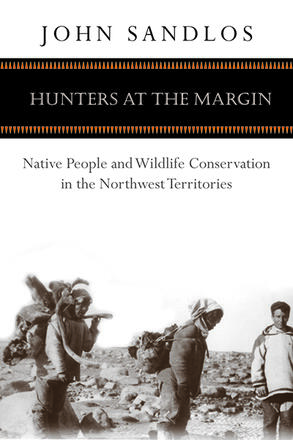
Hunters at the Margin
Native People and Wildlife Conservation in the Northwest Territories
This award-winning book examines the conflict between Native hunters and the government in the Northwest Territories – and the hidden motiovations behind conservationists’ wildlife management policies.
Description
Hunters at the Margin examines the conflict in the Northwest Territories between Native hunters and conservationists over three big game species: the wood bison, the muskox, and the caribou. John Sandlos argues that the introduction of game regulations, national parks, and game sanctuaries was central to the assertion of state authority over the traditional hunting cultures of the Dene and Inuit. His archival research undermines the assumption that conservationists were motivated solely by enlightened preservationism, revealing instead that commercial interests were integral to wildlife management in Canada. Hunters at the Margin examines the conflict in the Northwest Territories between Native hunters and conservationists over three big game species: the wood bison, the muskox, and the caribou. John Sandlos argues that the introduction of game regulations, national parks, and game sanctuaries was central to the assertion of state authority over the traditional hunting cultures of the Dene and Inuit. His archival research undermines the assumption that conservationists were motivated solely by enlightened preservationism, revealing instead that commercial interests were integral to wildlife management in Canada.
Awards
- Winner, Clio Award (North), Canadian Historical Association 2008
- Winner, Charles A. Weyerhaeuser Book Award, Forest History Society 2008
Reviews
This hefty text is a well-written and meticulously researched academic work. Sandlos provides eloquent and exquisite details of the relationship between human and animal. … It is certain to be of interest to readers keen to better understand the politics of northern conservation in Canada, and the conflict between Northern indigenous communities and Southern policy makers.
- Ben Laurie
For those interested in the history of conservation, wildlife management, First Nations, state power and individual agency, Sandlos offers insightful analysis within provocative framework and makes a significant contribution to the literature on conservation in Canada and is enjoyable to read.
- Jean L. Manore, Bishop's University
Professor Sandlos has written a very well-researched text on three major conservation issues. He examines the plight of the Bison, Muskox and Caribou in Canada’s north. The author has examined the questions raised about hunting of these three key species and the development and enforcement of laws relating to them. […] There is a lot of useful and thought provoking material embedded in the text. […] This book makes a significant contribution to the continuing research and debate required to make rational decisions.
- Roy John
As John Sadlos’s book shows, nothing in environmental politics is ever simple…. What began as an attempt to preserve a species…inevitably took on the coloration of a social experiment. The book is full of nuggets of interesting information….
- William R. Morrison
Sandlos offers useful (if tentative) conclusions about the implications of this history for present-day wildlife management and state-aboriginal relations in Canada, showing that history continues to shape the present, and that re-examining history can help illuminate current dilemmas and open new options for future action. Hunters at the Margin is well written, well produced, and a valuable contribution to the ongoing evaluation of the meanings of the North for those who live there, those who are new arrivals, and those for whom it looms large in imagination and expectation.
- Henry P. Huntington